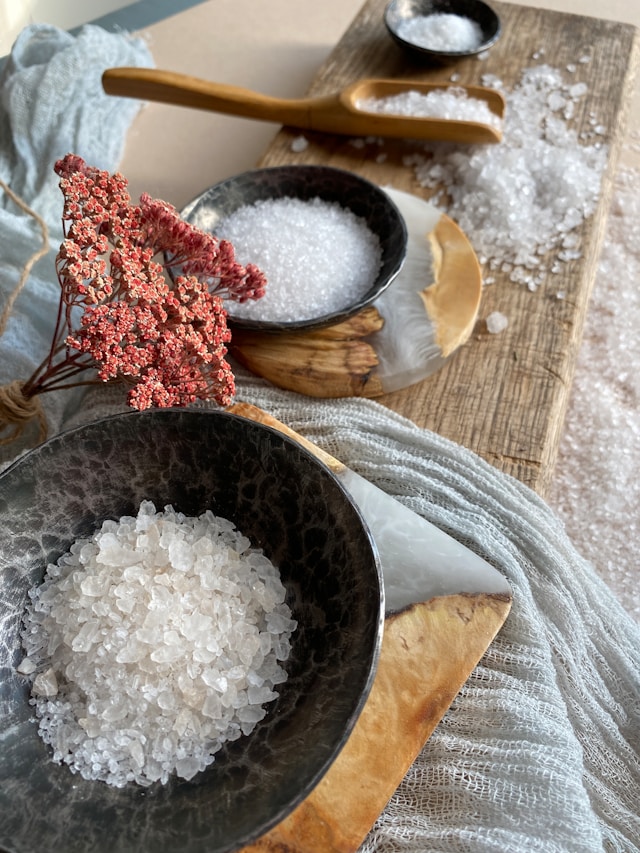Picture this: after a long, exhausting day, you sink into a warm bath infused with Epsom salt. As you relax, the tension melts away from your muscles, and a sense of calm washes over you. This simple yet luxurious experience is just one of the many wonders of Epsom salt. Beyond its soothing effects, Epsom salt is a powerhouse of health benefits, ranging from muscle recovery to skin rejuvenation. Let’s dive into the magical world of Epsom salt and discover why it deserves a place in your self-care routine.

Epsom salt may have health benefits beyond its relief and relaxation properties. However, it should not be ingested in the same ways it used to be (though it is considered safe when taken as directed in supplement form). Epsom salt baths should also be avoided under certain circumstances.
What is Epsom Salt?
Epsom salt, a naturally occurring mineral compound, consists of magnesium, sulfur, and oxygen. Epsom salt is not the same as table salt, despite having a similar chemical structure.
What exactly does Epsom salt do?
Today, the chemical combination remains a popular treatment for a number of diseases. According to the US National Research Council Committee on Diet and Health, “mineral salts are responsible for structural functions involving the skeleton and soft tissues as well as regulatory functions including neuromuscular transmission, blood clotting, oxygen transport, and enzymatic activity.”
Epsom salt, in particular, is frequently consumed as a supplement or utilized in cosmetic products such as body scrubs, body wash, and nerve-calming lotion. It is also sometimes dissolved in water and drunk to ease digestion; however, ingesting the raw mineral in this manner is not recommended.
Aside from its limited use as a supplement and beauty product, Epsom salt is most commonly advertised and advised as a bath soaking agent.

Taking an Epsom salt bath:
Epsom salt baths are intended to be “full-body experiences where Epsom salt is added to warm water,” as opposed to sitz baths, which typically consist of warm water only and are often taken in a very small amount of water targeting a specific area of one’s body. Such baths are often used “to relieve muscle aches, tension, stress, and promote overall well-being.” They are primarily used as a form of self-care and relaxation rather than to treat specific illnesses.
Is sea salt healthy for you? How it compares to other salts, and how to monitor your sodium intake

Do Epsom salts actually work?
When Epson salt is mixed with water, it breaks down and dissolves into magnesium and sulfate, which can be absorbed via the skin. While not well researched, such absorption can be useful in the aforementioned ways, and Epsom salt baths can also be an effective treatment for migraines and headaches.
Additional study suggests that Epsom salt baths may alleviate swelling and pain associated with arthritis and fibromyalgia, as well as act as a sleep aid.
Whether or whether these benefits have been scientifically verified, taking an Epsom salt bath has no major adverse effects. However, it is not recommended after surgery or for those with active skin irritation, infection, or burn injuries.
Epsom Salt vs. Massages and Saunas:
Epsom salt baths, massages, and saunas are all popular ways to relax and relieve stress, but each has its own set of benefits. Epsom salt baths are well-known for their ability to relieve painful muscles and joints, reduce inflammation, and promote overall relaxation. Epsom salt contains magnesium, which is supposed to be absorbed through the skin, thereby alleviating muscle cramps and improving sleep quality. Massage, on the other hand, is the manipulation of the body’s soft tissues, which can aid increase circulation, relieve muscle tension, and induce relaxation. Massages are frequently used to target specific areas of stress or pain and can be tailored to individual need. Saunas, such as Epsom salt baths, can also aid to relax muscles and reduce stress. They function by heating up the body, wich causes blood vessels to widen and increasing blood flow to the skin’s surface. This can enhance circulation and aid in the clearance of pollutants from the body. Overall, while Epsom salt baths, massages, and saunas each have distinct benefits, they can be combined to improve relaxation and overall well-being.
Who would benefit from an Epsom salt bath:
- Athletes and active individuals: Epsom salt baths can help soothe sore muscles and joints after intense workouts or physical activity.
- People with arthritis or joint pain: The magnesium in Epsom salt may help reduce inflammation and alleviate pain associated with arthritis or joint conditions.
- Individuals with skin conditions: Epsom salt baths may be able to help improve some skin conditions skin conditions like psoriasis, and similarly eczema and due to the anti-inflammatory properties.
- Those seeking relaxation and stress relief: Epsom salt baths are known for their calming effects, making them a great option for stress relief and relaxation.
- People with magnesium deficiency: Epsom salt is rich in magnesium, and soaking in Epsom salt baths can help increase magnesium levels in the body for those deficient in this mineral.

10 interesting facts about Epsom salt:
- Epsom salt is not actually salt but a mineral compound of magnesium and sulfate.
- It was first discovered in the 17th century in Epsom, England, hence the name.
- Epsom salt is believed to have been used by Cleopatra for its beauty and health benefits.
- It is used in agriculture as a natural fertilizer to improve plant growth.
- Epsom salt is a popular remedy for constipation when taken orally (under medical supervision).
- It can help remove splinters by reducing inflammation and drawing out the foreign object.
- Epsom salt baths can help alleviate sore muscles and improve recovery after exercise.
- It is used in some skincare products for its exfoliating and soothing properties.
- Epsom salt can be used as a natural alternative to traditional household cleaning products.
- It is believed to help improve sleep and reduce stress when used in baths or foot soaks.
Closing Thoughts from One Motion Forward:
In conclusion, Epsom salt, with its myriad of uses and benefits, remains a versatile and valuable addition to any home. Whether it’s soothing sore muscles, promoting relaxation, enhancing plant growth, or providing relief from various ailments, Epsom salt continues to be a trusted remedy. Its rich history and proven effectiveness make it a timeless choice for those seeking natural solutions for health, beauty, and household needs.
Step into Your Stride: Accept the Journey with One Motion Forward!
